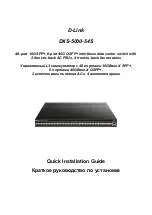
AT-8326GB Installation Guide
33
Below are the guidelines to follow when planning a port trunk:
G
The switch can support up to four port trunks at a time.
G
A port trunk can consist of up to four 10/100 Mbps twisted pair
ports or two gigabit ports.
G
The duplex mode, speed, and flow control settings must be the
same for all of the ports in a trunk.
G
When cabling a trunk, the order of the connections should be
maintained on both nodes. The lowest numbered port in a trunk
on the switch should be connected to the lowest numbered port
of the trunk on the other device, the next lowest numbered port
on the switch should be connected to the next lowest numbered
port on the other device, and so on.
G
The ports of a port trunk must be of the same type. For example,
they can be all twisted pair ports or all fiber optic ports.
G
For an AT-8326GB switch, you can create a port trunk of the GBIC
modules installed in the Port 25 and Port 26 slots, provided that
the GBIC modules are of the same type.
G
The ports on the end node must also be configured as a port
trunk.
Caution
Do not connect the cables of a port trunk to the switch until after
you have created the port trunk using the switch’s management
software. Connecting the cables before the port trunk has been
configured will create a data loop in your network topology, and
that could adversely affect network performance.
















































